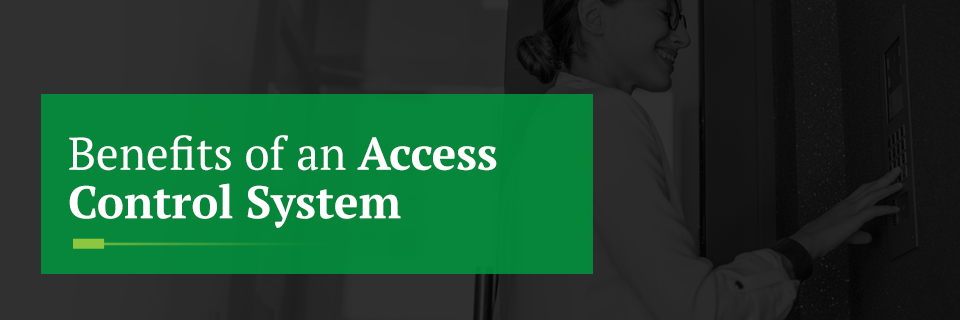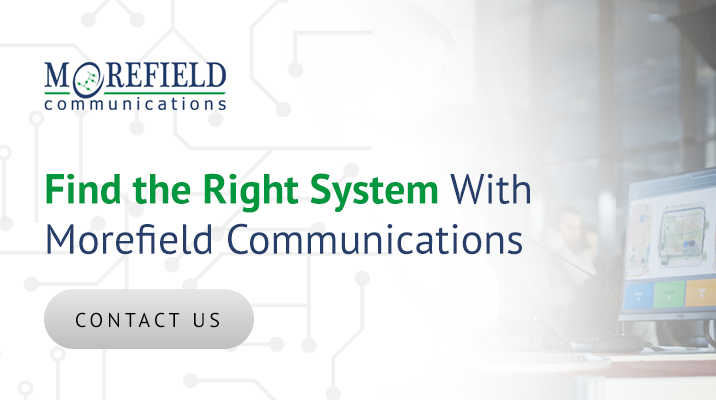Security is a top priority for businesses of all sizes. If you work with confidential information or expensive equipment, protecting your business’s assets is essential to success. Whether you have 10 or 10,000 employees, an access control system can allow or deny access and let your employees go where they need to go.
Access control systems can make life easier for your employees, save you money and keep your workplace secure. Whether you are a business owner weighing the pros and cons of an access control system, or an administrator looking for reasons to get one, this guide has your answers.
What Is an Access Control System and How Does It Work?
An access control system allows or restricts access to a building, a room or another designated area. It is an electronically powered form of physical security that manages who has access to a location at a particular time.
The User Experience
An employee who wants to enter an access controlled location presents their credentials. Credentials could be physical, such as an access control key card, or digital, such as information on a mobile device. A person makes an unlock request at a card reader, which then sends the information to an Access Control Unit, then authorizes the user and triggers the door to unlock.
The System Manager Experience
On the administrative side, an access control system has a management dashboard or portal. The control portal allows office administrators, IT managers or heads of security to specify who can access the premises and under what conditions. The manager can create settings based on shifts, time of day, the employee’s rank or job title and more. This system may also include a physical component, like a card-programming machine.
The System Infrastructure
The infrastructure of an access control system covers electric locks, card readers, door status for monitoring traffic and request to exit devices all reporting to the control panel and then the server:
- Electric locks: Fail safe locks, which will lock when supplied with power, and fail secure locks, which will unlock when supplied with power. Fail safe locks are necessary for doors on fire escape routes, and fail secure doors are for rooms that need to be protected in the event of an outage, such as an IT office. Fail secure doors will still need push bars that allow people to exit but not reenter in the case of an emergency.
- Access control panel: The control panel is usually set up in a secure location, such as an IT room or an electrical closet. Whenever someone’s credentials are scanned, the signal is sent to this control panel, which then sends the authorization to unlock the door.
- The access control server: The server stores the access control system’s data and permissions. This system decides to unlock a door for a specific user and tracks data for who enters and when. Servers can exist on a dedicated computer, a cloud-based service or in the card reader itself.
Who Uses Access Control Systems?
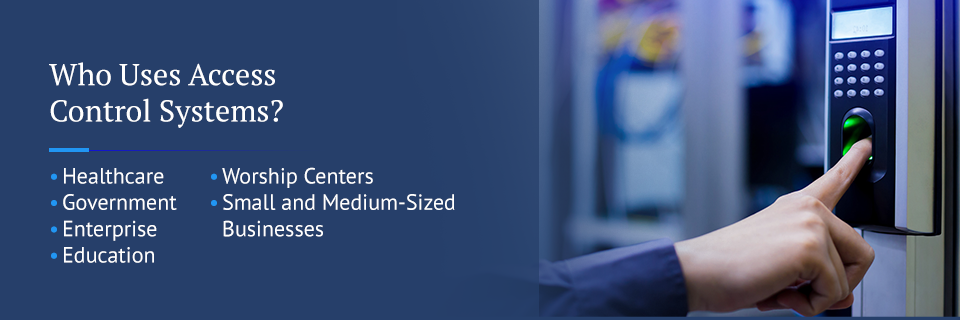
An access control system simplifies security in many ways. So, anyone with security needs can benefit from an access control system. Typically, in a rented office space, the landlord controls access to the building itself, and the tenants manage the access control for their areas. There are a variety of industries who can gain from access control systems, such as:
Healthcare
Those in the healthcare industry use access control systems to follow HIPPA regulations for health data confidentiality. Doctor’s offices, insurance companies and hospitals alike protect patients with access control systems. Access control systems can protect IT rooms or even equipment racks from unauthorized access, helping keep digital data secure. It can also safeguard physical files, examination rooms and equipment like MRI machines.
If you store chemicals or biomedical waste, access control systems can prevent untrained individuals from getting hurt.
Government
For local and state governments, security is a top priority. Government buildings are subject to homeland security regulations, which may mean restricting entry. Access control systems can verify employees and limit access to departments, confidential information and more, while maintaining public access to other areas.
Enterprise
Any business that accepts and processes credit cards must meet PCI credit card data regulations. Access control systems can also limit access to IT rooms and servers. They can track who accesses certain data and when, further protecting the information.
Education
Schools, especially universities with large campuses, have multi-location security needs. Access control systems make managing entry a breeze. Access control can keep students out of faculty parking lots, unauthorized individuals out of dorm rooms and more. If you have lab equipment or expensive computers, access control systems can be programmed to ensure only those registered for corresponding courses can access these areas.
Worship Centers
In sanctuaries and spiritual centers where all are welcome, balancing security and accessibility can be difficult. Access control makes it easy, keeping doors open during services and locked at other times. Churches, temples, synagogues and mosques can track employee’s comings and goings. They can also keep areas like schools, daycare centers and offices secure while keeping the rest of their facilities open to all.
Small and Medium-Sized Businesses
Key cards and access control systems are for more than big corporations with thousands of employees. Small and medium-sized businesses can reap the benefits of using an access control system, too. Access control is scalable, so small businesses can find solutions that work for their size and budget.
The right access control security system will be user-friendly, so you can protect your business without a security or technology background.
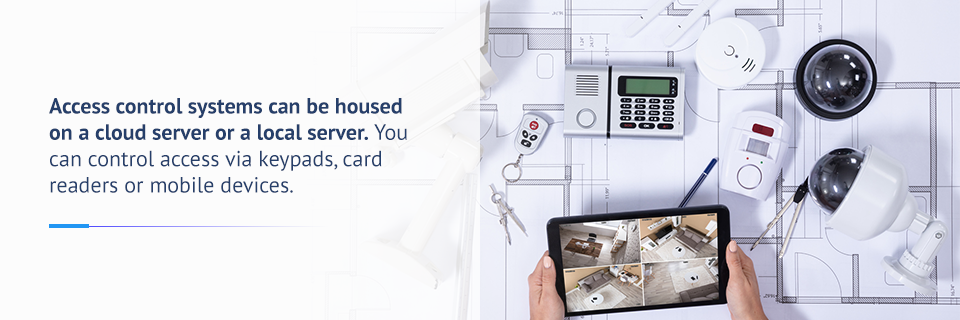
What Types of Systems Are There?
Access control systems can be housed on a cloud server or a local server. You can control access via keypads, card readers or mobile devices. When it comes to setting permissions, you have three options for how you can manage access:
- Role-based access control: In this control structure, all users who have the same role have equal access. For example, in a healthcare lab, all researchers can access a chemical storage room, while administrators cannot. This system can grant access based on the level of privilege, so employees of various seniority only access what they need.
- Discretionary access control: In this model, the business owner has control over who has access to each entry point. Each door’s card reader has a list of authorized users, set by the business owner, and these individuals have access to that building or area.
- Mandatory access control: Mandatory access control is the most restrictive. In this case, a policy, software or hardware component restricts access without exception. Mandatory access works for larger organizations where a head of security determines the rules that grant access. For example, employees may need to know a password or enter a pin into a keypad to enter a building. This is ideal for companies with lots of specific security needs, such as tech companies. It allows a centralized authority like a security office to make policy decisions about who can access what areas. It also enforces standardized security policy across many locations.
What Are the Benefits of Access Control Systems?
How can an access control system help your business? No matter the size or industry, automated access control can protect employees and let administrators know who accesses the premises. The most significant benefits of access control systems are:
1. Increase Ease of Access for Employees
An access control system allows you to “set and forget” who has access to each area of your business. Once you give the authorization, an employee can access all the areas they need to get their jobs done. With the scan of a key card or input of a PIN, the employee can get to wherever they need with ease.
2. Get Rid of Traditional Keys
The use of traditional keys has a few drawbacks. Restricting access to particular areas requires individual keys. The larger the building, the more locks you need. For an individual like a janitor or a high-clearance individual, this can mean a bulky key ring and confusion about which keys do what. An access control system saves time for those accessing restricted areas and also saves you visits from the locksmith.
Also, keys can be duplicated, leaving you vulnerable to unauthorized access. If an employee doesn’t turn in their key before they leave your company, you leave yourself unprotected or must get your locks changed. Access control security does away with this.
3. Save Money and Energy
With access control security, you save money on locks and security personnel. An access control system can verify a person’s identity without the need for a security guard.
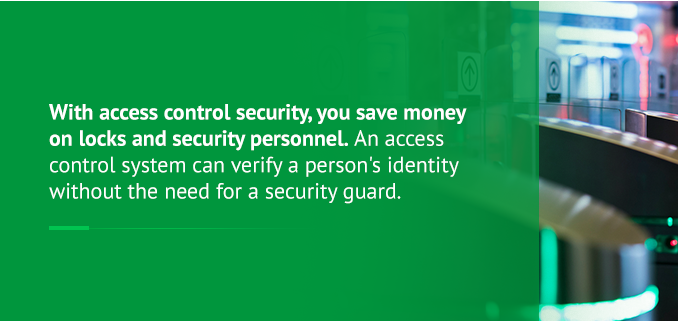
Access control systems can also be integrated with lighting, heating and cooling systems. Lights can turn on when there are people in a room and will shut off when they leave. You can also adjust temperatures when no one is in an area to save on energy costs.
4. Keep Track of Who Comes and Goes
An access control system gives you data on who enters and exits a building or room and when. You can ensure people are working when they are supposed to be. If theft or an accident occurs, you know exactly who accessed a specific area at the time of the incident.
5. Protect Against Unwanted Visitors
A large company creates an opportunity for visitors to go undetected. One of the benefits of using access control systems is that unauthorized people cannot get in. Since doors need credentials before they unlock, only those you’ve given credentials to can access the area. With this system, you can be sure everyone in your building is supposed to be there, whether you know them or not.
6. Give Employees the Freedom to Work When They Need To
When employees work at different times, an access control system lets them enter whenever they need to. People can come in early without waiting for someone to unlock the doors, and managers don’t have to stay late to lock up at the end of the day. You’ll have the ability to offer flexible schedules for your employees. With the management dashboard, you can also check comings and goings without being there yourself.
7. Prevent Against Data Breaches
Health information, financial records and client data are often stored on company-owned servers. Access control systems can restrict or grant access to IT rooms and even individual computers or networks, so only trusted individuals may access them.
8. Create a Safe Work Environment
Access control systems let trusted individuals inside and keep others out. You have the freedom to do background checks and keep out anyone without the right credentials.
Also, access control systems can keep your employees safe in the case of an emergency. Doors with lock-and-key mechanisms remain locked, which can be unsafe when a fire or other emergency requires a swift escape. Through the use of fail safe locks, doors unlock when the power cuts out, so all people can exit a building without the need to fumble for their keys.
9. Reduce Theft and Accidents
You can protect your company’s assets, expensive equipment or even office supplies by controlling access. You can restrict access to supply closets and computer banks, so only trusted individuals can access them. Employees know their arrivals and departures are tracked, which deters theft.
Also, lab equipment or chemicals in schools or hospitals can injure people who aren’t trained to use them. To prevent accidents, you can restrict access to only those who know how to follow safety protocols.
10. Provide Access to Multiple Buildings and Locations
Traditional key-based security gets complicated in areas with multiple locations. A school with two campuses might have some faculty members that teach at both and some that teach only at one. A hospital with two buildings might need to grant different levels of access to people who work in each building or on each floor. A national or regional company might set security policies at their headquarters to be followed at each branch.
Each of these situations can be managed with an access control system that can customize and implement access permissions across many locations.
11. Comply With Industry Regulations or Security Standards
There are many regulations for data security that need restrictions on physical access to data. Anyone in the healthcare industry must comply with HIPPA, but most organizations are subject to these regulations as well. If an employee or student requests a medical leave, records of the individual’s illness must be kept secure. In the world of commerce, customers’ financial information must be kept safe, and IT Departments must restrict access to servers and digital data.
All this information, whether it is a digital or paper file, can be secured with an access control system.
Find the Right System With Morefield Communications
At Morefield Communications, we help find the security solutions that fit your needs, size and budget. Access Control Systems are an excellent solution to security needs that work well on their own and as part of a physical security network. With over 75 years of service, we have the expertise to provide reliable security solutions.
As a Pennsylvania-based company, we are invested in the success of local businesses, as well as our community, which helps us find the most efficient solutions for our customers. When you choose Morefield Communications as your security provider, you receive a holistic approach to all of your technology needs.
To discuss how we can help you protect your business and give your employees a safe work environment, contact us today.
